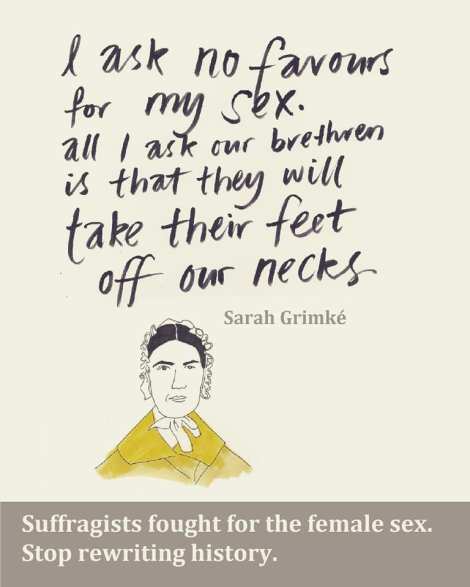Another one of these Shut Up, Bitch items:
The news outlet Stuff reported on August 19 that “A company has pulled posters commemorating women’s suffrage after pressure from LBTGI youth groups who say the feminist blogger behind the poster campaign holds transgender exclusionary beliefs.” The feminist artist and writer concerned is Renée Gerlich.
The feminist blogger “holds beliefs” that some trans activists don’t like and therefore she must be entirely silenced in every medium and venue.
A non-political small business was engaged by Gerlich to put up some posters she had produced. In New Zealand cities, a large proportion of public and private billboard space available for publicity posters is owned or used by this company, called Phantom Billstickers. According to a promotional article in Ponsonby News, the company was founded in 1982 “mainly to give musicians, the arts and creative people in New Zealand a voice.”
When the posters appeared, Phantom Billstickers was inundated with ‘complaints’…
…so no more posters for her.
Some of the censored posters are reproduced here. They consist of portraits of leaders of the worldwide fight for women’s suffrage in the late nineteenth and early twentieth centuries, including Emmeline Pankhurst in the United Kingdom, Sojourner Truth, Sarah Grimké and Susan B Anthony in the United States, and Mary Ann Müller in New Zealand, together with handwritten quotes from their speeches and writings. Across the bottom of each poster is a statement from the artist: “Suffragists fought for the female sex. Stop re-writing history.” A related series of posters does a similar thing with contemporary feminists.
Here’s one:

The post goes on:
The Phantom Billstickers’ director also appeared to acknowledge that there was absolutely nothing in the content of these posters that could possibly be considered objectionable, or that could justify the censorship in any way, when he said, “The core issue was not the posters themselves, but Gerlich’s blog.”
It’s worth taking a minute to consider the implications of that statement (which evidently reflects the attitude of the censors.) Artwork is to be censored, not because of the content of the artwork itself, but because of something the artist has said in another forum, at another time. In other words, it is not just the artwork that is being banned, but the artist herself.
That is indeed how this works. Feminists labeled “transphobic” are to be banished entirely, regardless of how distant their subject matter may be from trans issues. Women who want to talk in public have two choices: agree with and repeat every claim made by trans activists, no matter how batshit crazy, or be banished from every outlet the activists can bully into complying. There’s no middle ground where you can decide to bracket trans issues and talk about other things; you are a Forbidden Person.
To find a historical precedent for this sweep of censorial powers it is necessary to go back to the personal ‘banning orders’ imposed on individuals in Apartheid-era South Africa, or the Soviet Union in the depths of the Stalinist counter-revolution. Or, perhaps more appropriately given its deeply misogynist character, to the witch-trials of dead centuries. Today’s self-appointed liberal censors, who use the slur TERF against women in much the same way that the accusation of ‘witch’ was used in the past, will be satisfied with nothing less than a confession of witchcraft.
And in fact, Gerlich has been targeted by continuous pile-on campaigns to silence her for the past two years. She was hounded out of her job, banned from the 2016 Wellington Zinefest, and had a petition signed by 120 people calling for her to be barred from access to the media and academic research. Comments threatening violence have been left on her blog, such as “I hope you get hit by a truck, bitch.”
Very left wing, much progressive.
A guy called Don Franks did a radio interview with Gerlich.
When Franks started promoting the upcoming interview, he received a strong warning from the station’s Community Liaison and programme development officer, Esther Taylor. “Renée Gerlich has a history of publishing transphobic and anti-sex worker comments on public forums, and targeting people in these communities,” Taylor said. “Freedom of speech, the ability to express different views, and the facilitation of discussion are fundamental cornerstones of Access Radio. However, we are wary that some of Renée Gerlich’s views could be seen as an attack on minority groups or as hate speech… We will not broadcast parts of the interview which are deemed transphobic or anti-sex worker.”
I’m betting the “anti-sex worker” claim is a complete lie, even accepting the premises about what constitutes “anti” and “phobic.” It’s customary to treat the two as inextricably linked, with no need to show examples of both.
H/t Lady Mondegreen in Miscellany Room.



